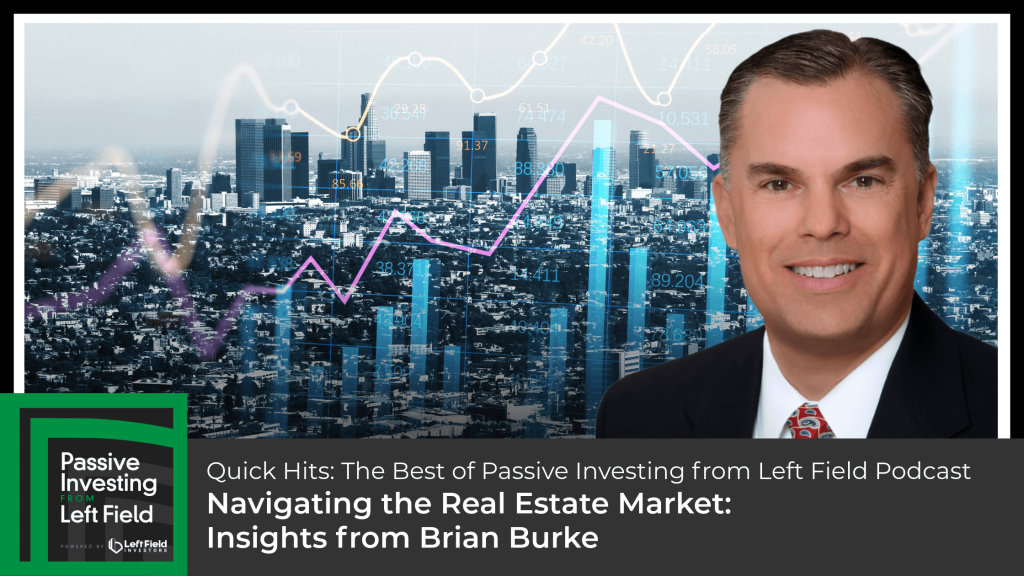In a recent episode of Passive Investing from Left Field, host Jim Pfeifer sits down with Brian Burke, president and CEO of Praxis Capital, to discuss the current state of the real estate market. With over $800 million in real estate acquisitions, Brian shares his experience and offers valuable advice for passive investors looking to weather these challenging times and emerge stronger.
Capital Preservation and Patience
Brian emphasizes the importance of capital preservation and a disciplined approach to investing. Despite the challenges faced by many investors, he has maintained his impressive track record of not losing investor money. This success can be attributed to his unwavering commitment to safeguarding his investors’ capital and making prudent investment decisions.
When considering future acquisitions, Brian advises patience and caution. In a turbulent market, it can be tempting to jump at seemingly attractive opportunities, but Brian stresses the importance of waiting for clear signs of market recovery before making significant moves. This approach ensures that investors are not caught off guard by sudden market shifts and can make informed decisions based on solid fundamentals.
Rate Caps and Debt Structures
Diving into the intricacies of rate caps and debt structures, Brian explains how these financial tools can help mitigate risks and protect investor capital in a fluctuating market. Rate caps, which limit the maximum interest rate paid on a loan, can provide a degree of stability and predictability in an environment where interest rates are subject to change.
Brian also highlights the distinction between bridge debt and agency adjustable debt, stressing the risks associated with short-term maturities and the importance of having the flexibility to ride out market downturns. Bridge debt, which typically has a shorter term and is used to fund the acquisition and rehabilitation of a property, can be particularly risky in a volatile market. If the property fails to stabilize or sell within the expected timeframe, investors may find themselves in a precarious position.
On the other hand, agency adjustable debt, such as Fannie Mae or Freddie Mac loans, often provides more flexibility and longer terms. While these loans may have adjustable interest rates, they also offer the benefit of extended maturity dates, allowing investors more time to weather market fluctuations and implement their business plans.
Realistic Expectations for Distributions
Brian emphasizes the need for investors to align their expectations with market realities. Distributions should reflect a property’s actual cash flow rather than a fixed, predetermined amount. This means that investors should be prepared for fluctuations in their income streams, especially during challenging market conditions.
He cautions against sponsors distributing money from sources other than operations, such as capital reserves or refinancing proceeds, as it can mask an asset’s true performance. While this practice may provide short-term relief to investors, it can ultimately lead to long-term instability and diminished returns.
Capital calls, once a red flag, have become more common in the current market. These occur when a sponsor requires additional funds from investors to cover unexpected expenses or to take advantage of new opportunities. Brian advises understanding the circumstances surrounding these calls and evaluating a sponsor’s ability to navigate challenges. Investors should carefully consider the track record and experience of their sponsors before committing additional capital.
Debt Funds and Alternative Strategies
Debt funds can provide attractive returns while mitigating risks, offering a degree of safety that may be lacking in traditional equity investments. These funds typically invest in a diversified portfolio of real estate loans, providing exposure to the real estate market without the direct ownership of properties.
Brian shares insights on Praxis Capital’s bridge mortgage fund, which has generated consistent returns for investors while maintaining a conservative approach to risk management. By focusing on short-term, first-position loans to experienced real estate investors, the fund has been able to provide stable income to its investors while minimizing the risk of default.
Looking Ahead
Diversification, both in asset classes and sponsors, is crucial for investors looking to navigate the uncertain real estate market. Brian advises focusing on quality over quantity when selecting investment partners, seeking out sponsors with a proven track record of success and a deep understanding of their target markets.
He also warns against chasing high internal rates of return (IRRs) and encourages investors to view these opportunities as speculation rather than core investments. In a market where cap rates are compressed and competition for deals is fierce, sponsors may be tempted to underwrite aggressive assumptions to justify higher returns. However, this approach can lead to disappointment down the line if the projected growth fails to materialize.
Instead, Brian recommends that investors focus on the fundamentals of each investment opportunity, such as the quality of the asset, the strength of the sponsor, and the overall market dynamics. By taking a long-term view and prioritizing cash flow over speculative appreciation, investors can build a more resilient portfolio that can withstand market volatility.
Patience, discipline, and a focus on fundamentals will position investors to weather the storm and emerge stronger. This may mean passing on deals that don’t meet strict underwriting criteria or waiting on the sidelines until more favorable conditions arise. While it can be challenging to resist the fear of missing out, a disciplined approach will ultimately lead to better outcomes in the long run.
Lessons Learned
Throughout the episode, Brian’s insights serve as a valuable road map for passive investors navigating the challenges and opportunities of the real estate market. His emphasis on capital preservation, realistic expectations, and the importance of quality sponsors resonates with listeners seeking to build long-term wealth through real estate investing.
One of the key takeaways from the conversation is the importance of aligning one’s investment strategy with personal goals and risk tolerance. While it can be tempting to chase high returns or follow the crowd, successful investors understand the value of staying true to their own objectives and making decisions based on sound analysis and due diligence.
Another important lesson is the need for adaptability in the face of changing market conditions. As Brian points out, the real estate market is constantly evolving, and what worked in the past may not work in the future. By staying informed, maintaining a flexible mindset, and being willing to pivot when necessary, investors can position themselves to capitalize on new opportunities as they arise.
Ultimately, building a successful real estate investment portfolio requires a combination of knowledge, skill, and perseverance. By learning from the experiences of seasoned professionals like Brian Burke, passive investors can gain the tools and insights needed to make informed decisions and achieve their long-term financial goals.
To gain more valuable insights from Brian Burke and other industry experts, tune in to Passive Investing from Left Field. This episode offers a wealth of knowledge for passive investors looking to deepen their understanding of the market and make informed decisions in uncertain times.
Take Your Investing to the Next Level
If you enjoyed Brian’s wisdom and stories, the Left Field Investors (LFI) Community offers more great resources to advance your real estate investing education.
Become an LFI “Infielder” to access:
- Exclusive educational content and investor training programs
- Off-market investment opportunities from vetted sponsors
- A network of thousands of like-minded passive investors
- Virtual and in-person events to engage with experts
- The support to confidently build your investment portfolio
Whether you are new to passive real estate investing or a seasoned veteran, LFI provides contacts, knowledge, and opportunities.
Join now to take your investing to the next level!








